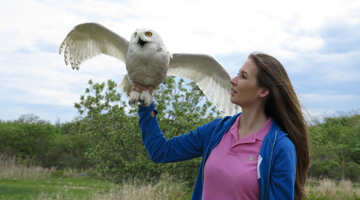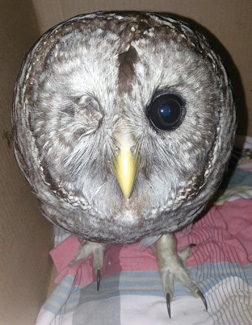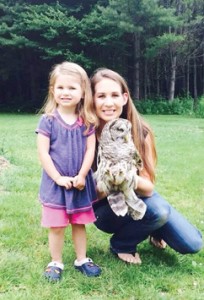
July 18, 2014
By Barbara Allen
The barred owl, with its distinctive brown and white plummage arranged in “bars” across its breast and wings, was still a handsome bird, despite having lost an eye due to injuries sustained after being hit by a car.

After several weeks of care and rehabilitation at the Wildlife Clinic at the Cummings School of Veterinary Medicine in North Grafton, the owl was finally well enough to be released back into the wild. Its one functional eye solemnly watched Jessica Zorge, staff assistant at the clinic and the young woman who was about to send it on that journey.
Another barred owl, who had also been brought into the clinic after having become tangled in netting and suffered soft tissue damage, was also ready for release; both owls had recuperated together in the facility and would be sent back into the wild at the same time.
“I hope I never see you again,” Zorge told the two owls before releasing them onto the property surrounding her Bolton home. She knew it would be a good spot, as other barred owls lived nearby; Zorge had heard their characteristic call. “Have a nice flight.”
Zorge said that she regularly releases wildlife in Bolton. “It’s such a beautiful area for owls.” Returning animals to the wild is one of her favorite parts of the job. “I see them when they come in, and then when they get to leave.”
Harper Holyoak, Zorge’s 3-year-old daughter, was with her mother when she returned the owls to the wild. She is an active participant at the releases. But, Zorge remarked, her daughter has sometimes taken her to task for the wording of her farewell to the creatures she is letting free.
“Mommy, that’s not nice,” she reprimanded Zorge, in response to the “hope to never see you again” part of her mother’s message.
Even though her statement to the owls might confuse her daughter, Zorge means every word of it.
“I don’t want to see them again,” she asserted, referring to any of the animals that she releases into the wild. She wants them to stay healthy and safe in their own habitat.
In addition to her position at the Wildlife Clinic, Zorge, who has a BS in Veterinary Studies from Becker College, is also a licensed wildlife rehabilitator.

Courtesy photo
“Just the other night, someone dropped off a chimney swift at my home at midnight,” she laughed. “A tiny hatchling, no bigger than a quarter.” She added that she also has several baby possums in an incubator in one of her bathrooms.
Zorge said there is a continued need for more animal rehabilitators in the state of Massachusetts, and pointed out that this year there are more baby animals than ever requiring a rehab home.
In addition to caring for orphaned animals, rehabilitators may also care for animals who are ill or have been injured, with the ultimate goal of returning them to the wild once they are well enough or old enough to do so. Wildlife rehabilitators provide their services on a volunteer basis; everything from cages to food and medication are paid for out of their own funds.
Although Zorge admits to having a soft spot in her heart for all animals, her passion is raptors: hawks, eagles, and, most especially, owls.
“I’ve just always had a personal connection with owls,” Zorge explained. She is working on obtaining the federal permit that will allow her to care for them at her home; she already has the state permit required to obtain federal approval.
“Once my federal permit gets approved, my rehabbing services will be small scale, where I will rehabilitate one or two raptors at a time,” said Zorge. She will be building a raptor enclosure, according to specific federal guidelines. The enclosure allows the birds of prey to get much-needed exercise and exposure to fresh air and sunshine. She expects the structure will be completed by the fall of this year.
Zorge has passed her love of owls and other animals along to her family. Besides her daughter, there is Harper’s father, Mark Holyoak, who Zorge describes as “the handiest person I know; he builds the cages.” She added, “He feels the same way that I do… that all animals deserve a chance.”
To learn more about becoming a wildlife rehabilitator, call Mass Wildlife at 617-626-1575.